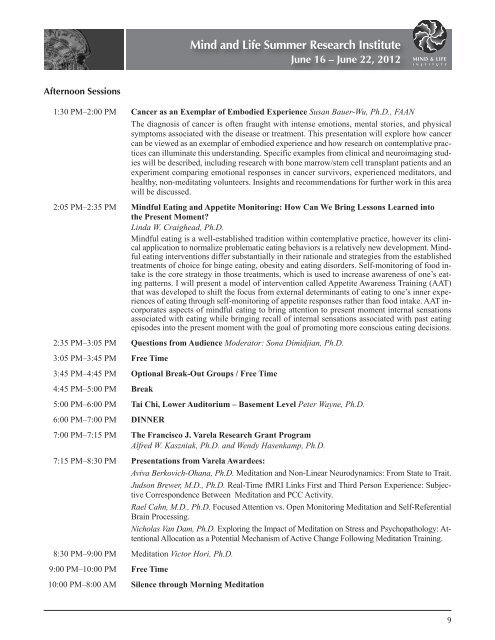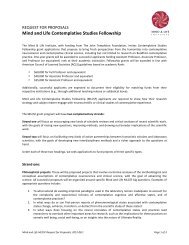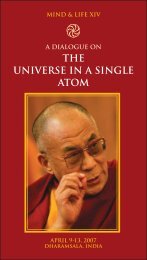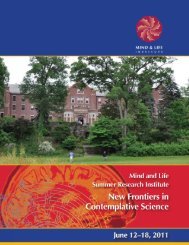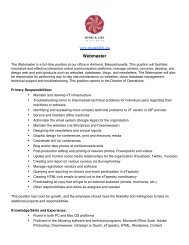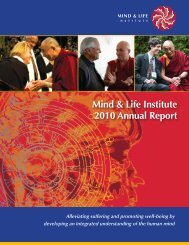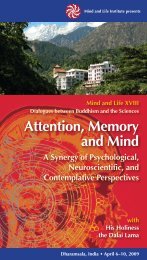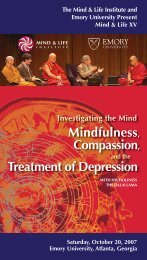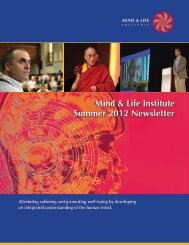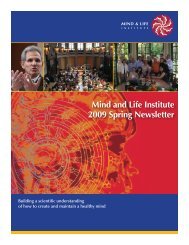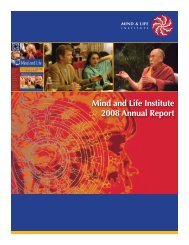CONFERENCE BROCHURE - Mind & Life Institute
CONFERENCE BROCHURE - Mind & Life Institute
CONFERENCE BROCHURE - Mind & Life Institute
Create successful ePaper yourself
Turn your PDF publications into a flip-book with our unique Google optimized e-Paper software.
<strong>Mind</strong> and <strong>Life</strong> Summer Research <strong>Institute</strong>June 16 – June 22, 2012Afternoon Sessions1:30 PM–2:00 PM Cancer as an Exemplar of Embodied Experience Susan Bauer-Wu, Ph.D., FAANThe diagnosis of cancer is often fraught with intense emotions, mental stories, and physicalsymptoms associated with the disease or treatment. This presentation will explore how cancercan be viewed as an exemplar of embodied experience and how research on contemplative practicescan illuminate this understanding. Specific examples from clinical and neuroimaging studieswill be described, including research with bone marrow/stem cell transplant patients and anexperiment comparing emotional responses in cancer survivors, experienced meditators, andhealthy, non-meditating volunteers. Insights and recommendations for further work in this areawill be discussed.2:05 PM–2:35 PM <strong>Mind</strong>ful Eating and Appetite Monitoring: How Can We Bring Lessons Learned intothe Present Moment?Linda W. Craighead, Ph.D.<strong>Mind</strong>ful eating is a well-established tradition within contemplative practice, however its clinicalapplication to normalize problematic eating behaviors is a relatively new development. <strong>Mind</strong>fuleating interventions differ substantially in their rationale and strategies from the establishedtreatments of choice for binge eating, obesity and eating disorders. Self-monitoring of food intakeis the core strategy in those treatments, which is used to increase awareness of one’s eatingpatterns. I will present a model of intervention called Appetite Awareness Training (AAT)that was developed to shift the focus from external determinants of eating to one’s inner experiencesof eating through self-monitoring of appetite responses rather than food intake. AAT incorporatesaspects of mindful eating to bring attention to present moment internal sensationsassociated with eating while bringing recall of internal sensations associated with past eatingepisodes into the present moment with the goal of promoting more conscious eating decisions.2:35 PM–3:05 PM Questions from Audience Moderator: Sona Dimidjian, Ph.D.3:05 PM–3:45 PM Free Time3:45 PM–4:45 PM Optional Break-Out Groups / Free Time4:45 PM–5:00 PM Break5:00 PM–6:00 PM Tai Chi, Lower Auditorium – Basement Level Peter Wayne, Ph.D.6:00 PM–7:00 PM DINNER7:00 PM–7:15 PM The Francisco J. Varela Research Grant ProgramAlfred W. Kaszniak, Ph.D. and Wendy Hasenkamp, Ph.D.7:15 PM–8:30 PM Presentations from Varela Awardees:Aviva Berkovich-Ohana, Ph.D. Meditation and Non-Linear Neurodynamics: From State to Trait.Judson Brewer, M.D., Ph.D. Real-Time fMRI Links First and Third Person Experience: SubjectiveCorrespondence Between Meditation and PCC Activity.Rael Cahn, M.D., Ph.D. Focused Attention vs. Open Monitoring Meditation and Self-ReferentialBrain Processing.Nicholas Van Dam, Ph.D. Exploring the Impact of Meditation on Stress and Psychopathology: AttentionalAllocation as a Potential Mechanism of Active Change Following Meditation Training.8:30 PM–9:00 PM Meditation Victor Hori, Ph.D.9:00 PM–10:00 PM Free Time10:00 PM–8:00 AM Silence through Morning Meditation9


